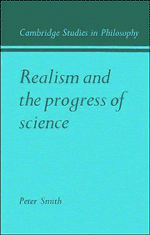3 - A theory of interpretation
Published online by Cambridge University Press: 07 October 2011
Summary
THE INDETERMINACY OF TRANSLATION OF SENTENCES
The third most basic of the four questions I originally posed as being crucial to a realist defence of the growth of scientific knowledge was:
(3) What conditions have to be satisfied by a natural kind predicate “ϕ” and an object a in order for “ϕ”, as it is used within a linguistic community C, to be correctly applied to a?.
I explained that this was a question of conceptual analysis, of what it is for a natural kind predicate to have an extension. In the next chapter I shall consider in detail what the correct answer is to this question. Even at this stage, however, it should be apparent what sort of answer I shall be proposing. I take the theory of reference underlying my realist position to be firmly in the tradition of Frege. The extension of a predicate is thus a function of its sense, and sense is an epistemological notion derivative from belief. I shall explain these ideas more fully in the next chapter. For the present I wish to make clear that, according to the account I shall give, an investigation into which objects belong to the extension of a natural kind predicate “ϕ”, as it is used within a linguistic community C, is first and foremost, though not only, an investigation into what descriptions could be consistently attributed to ϕs on the basis of what is believed about ϕs within C.
- Type
- Chapter
- Information
- Realism and the Progress of Science , pp. 46 - 69Publisher: Cambridge University PressPrint publication year: 1981



